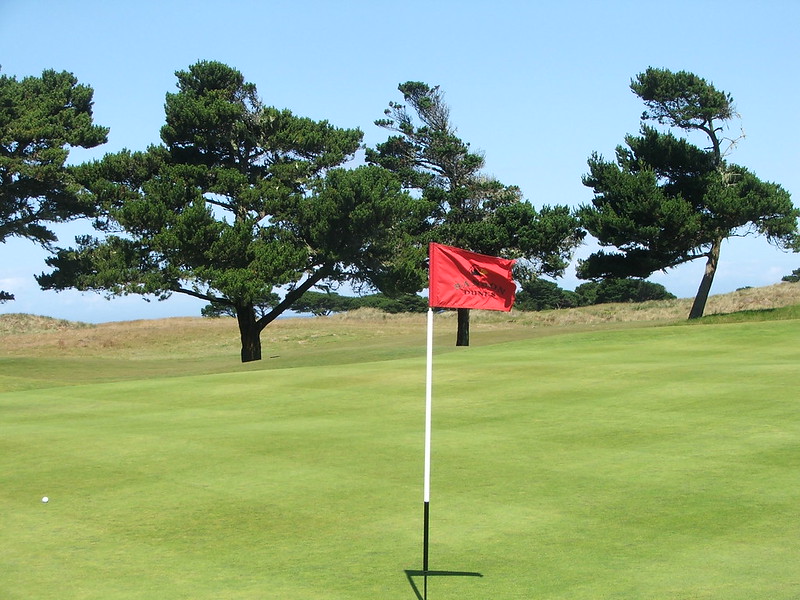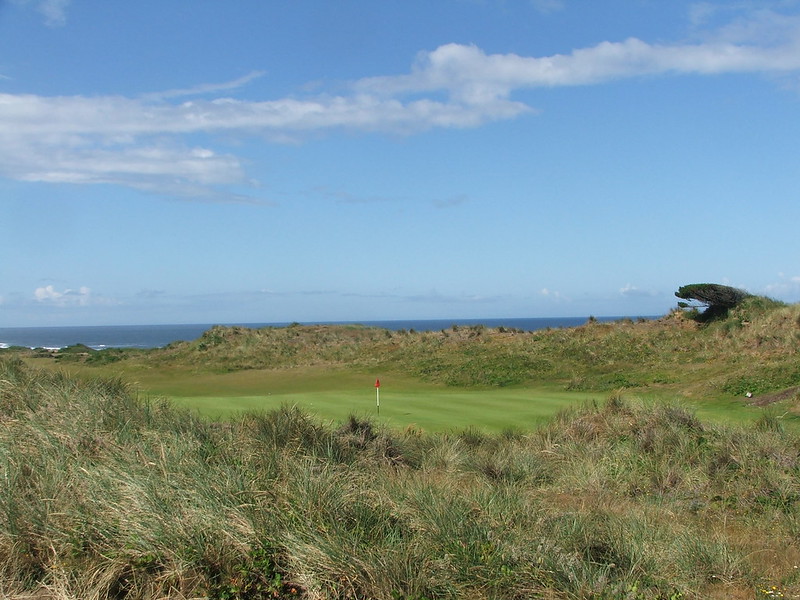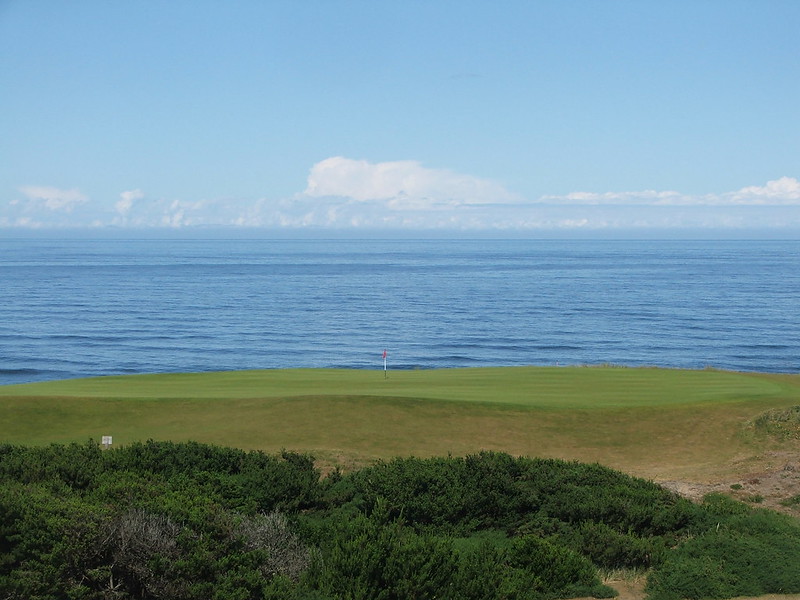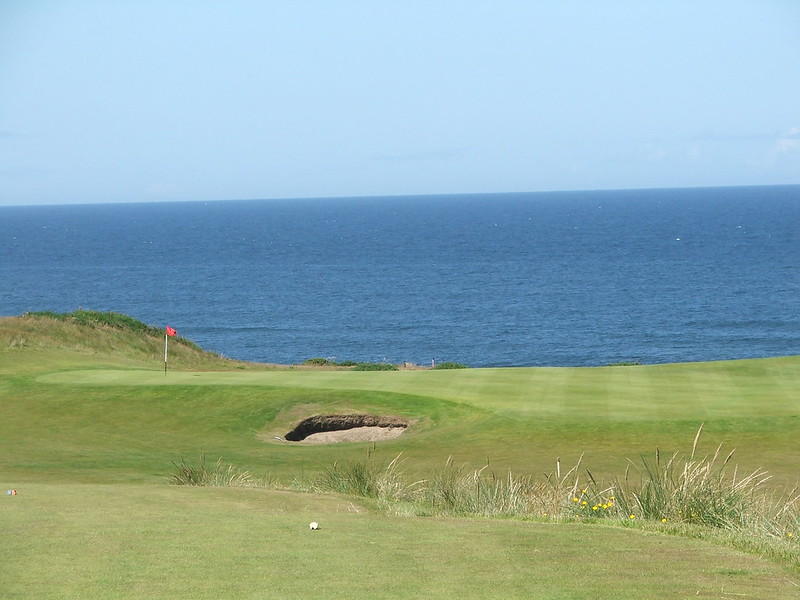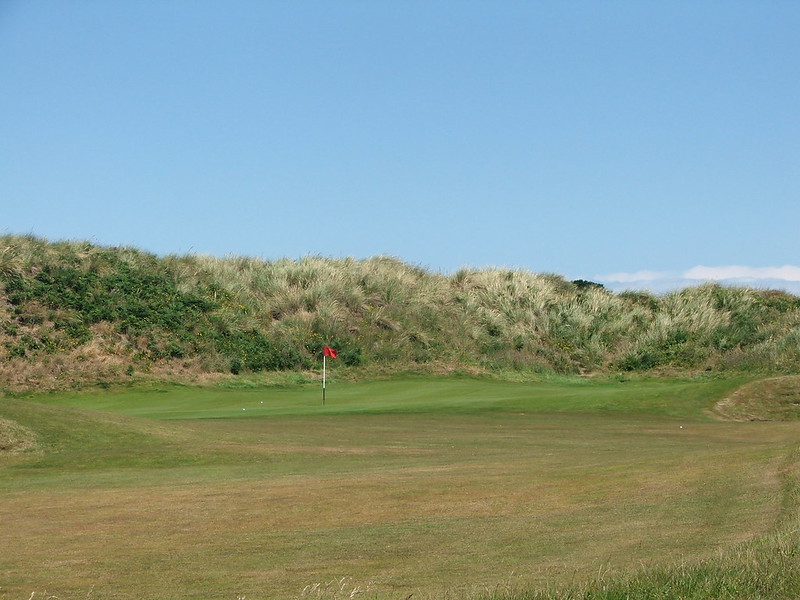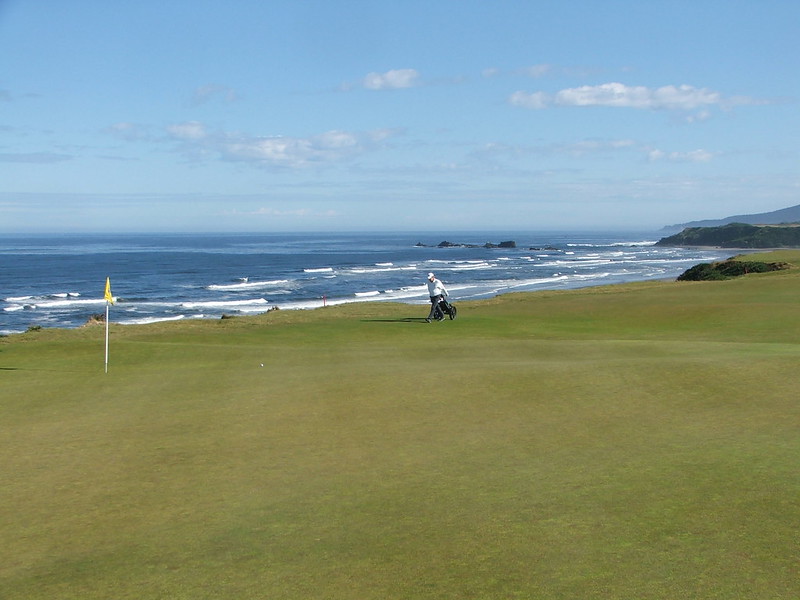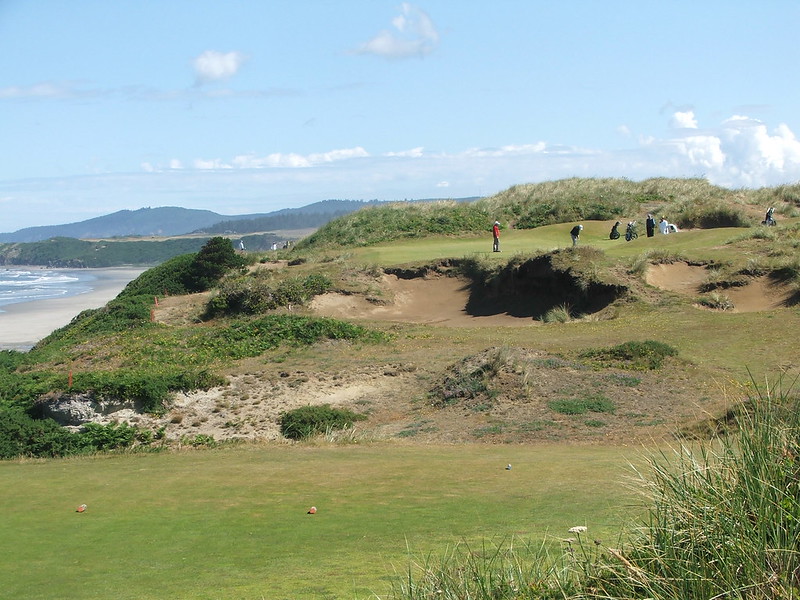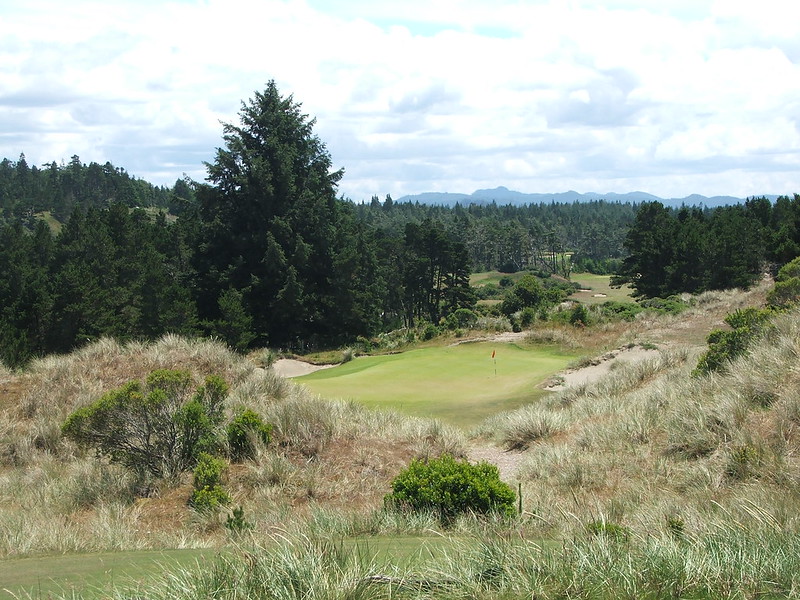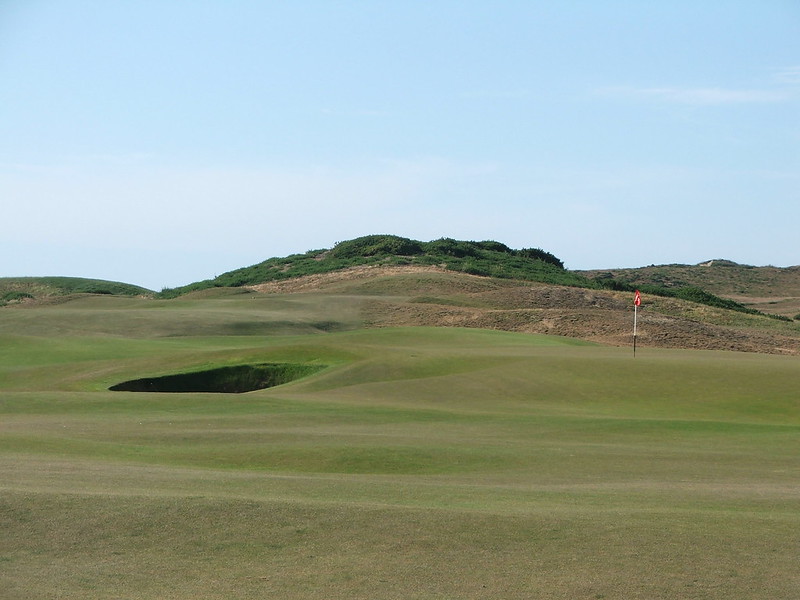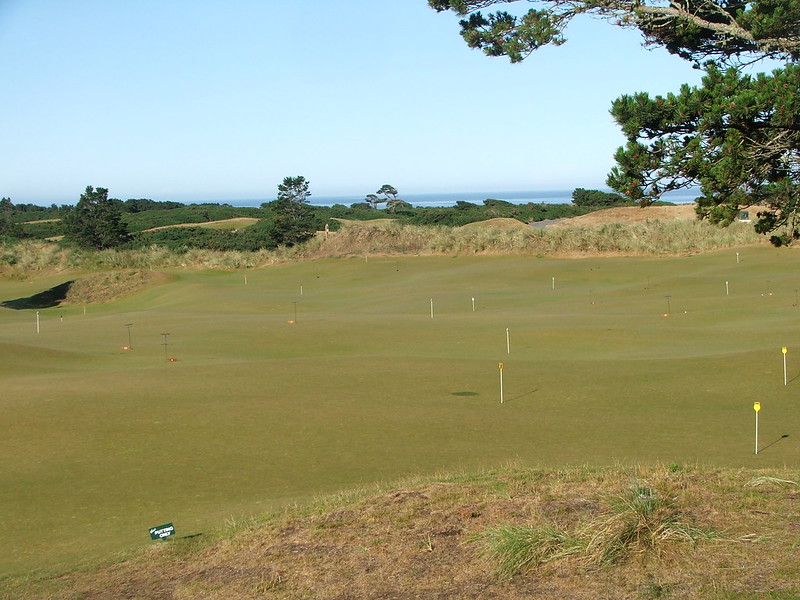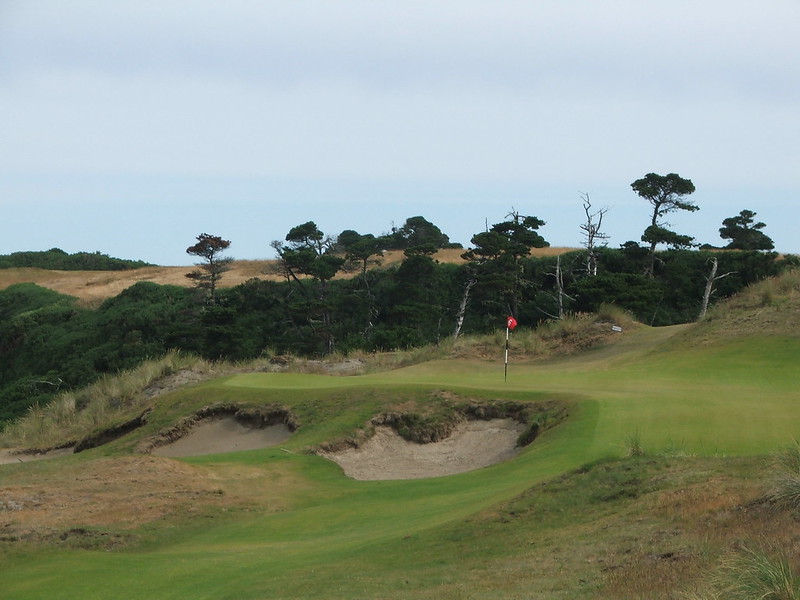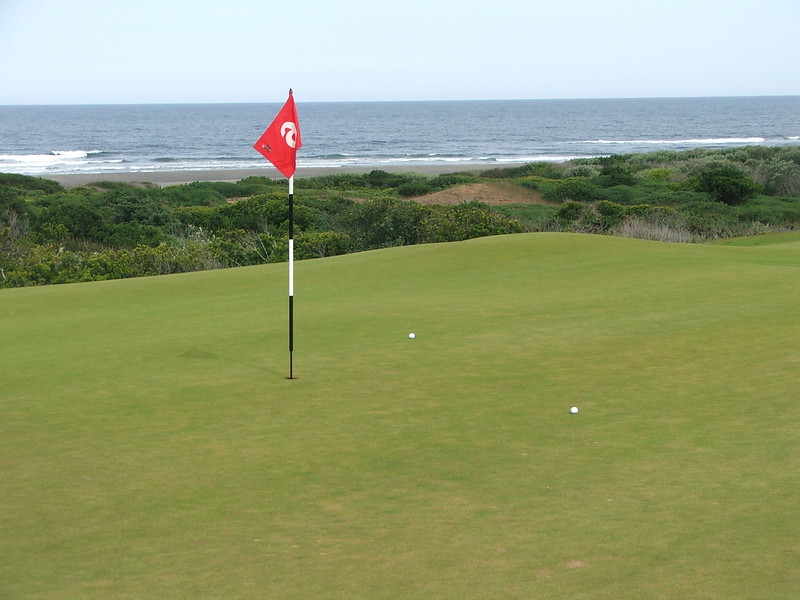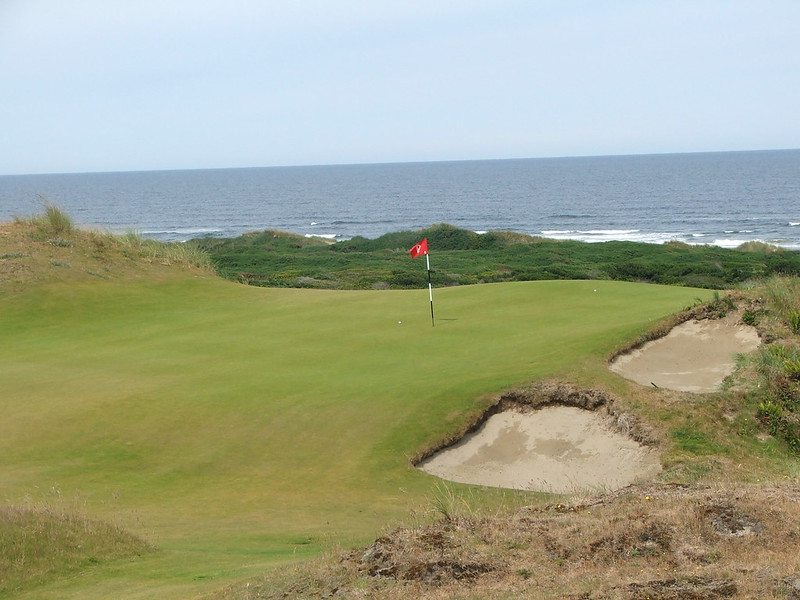I came home from my June visit with a sun tan; we had only one round where there was a two club wind, otherwise it was in the mid-seventies with brilliant sunshine and minimal winds.
Woe betide the golfer at Bandon Dunes when the pin flags are standing upright in a stiff wind
Before looking at each course individually, I’ll start off with some do’s and don’ts at Bandon:
Top recommendations while at Bandon Dunes
1. Play Bandon Dunes in the morning when the winds are lower
2. Play Pacific Dunes in the morning when the winds are lower
3. Play the 13-hole par three Bandon Reserve course to rediscover that golf doesn’t have to be a full eighteen-hole round in order to be immensely enjoyable
4. Play Old Macdonald in the afternoon as the sun is setting
5. Putt on the Punchbowl course, drink in hand, at twilight
6. Sit in front of the roaring oversized fire pit outside McGee’s pub and enjoy a cocktail or a cigar
7. Order the ultimate comfort food (Reuben fritters and Grandma’s Meatloaf) at McGee’s pub
8. Go for an early morning or late afternoon walk on any of the courses and listen to the sounds of nature and absorb the isolated surroundings
9. Have a card game or play pool in the Bunker Bar in the Lodge
10. Have dinner at the Pacific Grill; the food is inventive and delicious
11. Take a caddie
12. Play Bandon Trails in the afternoon, it gets less wind than the other courses
Top things to avoid while at Bandon Dunes
1. Walking Bandon Trails as your second round of the day. The walk is very difficult.
2. The bunkers left of the par three 17th "Redan" hole at Pacific Dunes. Yikes!
3. Using your lob wedge around the greens. Putt or chip with a less lofted club since the lies are so tight.
4. Acting like a complete wanker by playing music on the course. *
The Bandon Experience
Is it just me, or do you fantasize while traveling that you
could see yourself permanently relocating to the location you are visiting? I
have fantasized about living in Scotland, Rome, Florence, Queenstown, New
Zealand, the Caribbean, Charleston, and many more locations. My latest fantasy
is to move to the Oregon Coast. What do you think? Play some world-class golf
courses, ride my 4 x 4 along the broad beaches along the coast (even though I
don’t own a 4 x 4), take up fly fishing, take some day trips to the Willamette
Valley wine country? Life would be good.
The Bandon Dunes resort, located in Southern Oregon, five hours from Portland, represents the best that golf has to offer. The resort, conceived and built by entrepreneur Mike Keiser, was developed with an ethos that I find refreshing in our age of rampant commercialism. The resort was built with the philosophy "Golf as it was meant to be." All the courses are walking only and were designed in the traditional style you find in the British Isles. This is links golf with no cement cart paths, no formalities, and an abundance of caddies. In this regard (the overall philosophy), Bandon Dunes is superior to other resorts in the U.S., many of which were built with the intention of hosting large crowds and major championships.
Bandon Dunes is closest to golf's founding philosophy: it is public and was designed to put great golf above all else. When he
conceived of the resort, Keiser also selected relatively unknown (at the time)
architects: the Scotsman David McLay Kidd for Bandon Dunes and Tom Doak for
Pacific Dunes, which turned out to be brilliant moves. Rather than imposing
pre-conceived notions on this special stretch of sand dunes, each developed the
courses in a minimalist philosophy and achieved great results.
I saw Mike Keiser interviewed on The Golf Channel when Bandon Dunes hosted the 2006 Curtis Cup and they asked him what he was most proud of. His answer was that the courses at Bandon were packed in the winter, often times while it was raining, and that group after group continued to tee off nonetheless. It is a testament to how good it is. You have tolike love Keiser’s
philosophy. His vision is that the Bandon Dunes Resort becomes a great venue
for amateur golf and that they would play host to amateur, not professional, events.
His basic philosophy is to run the resort to break even, not to gouge
golfers. I personally find this philosophy to be a breath of fresh air in a
golf world increasingly obsessed with housing developments and courses built to
host major championships (and with escalating fees.) I was continually surprised at how reasonable the golf, food, and drinks
were the entire time I was on property. There are more than enough shuttles on the property that it seems like they appear instantly when you call for one,
The Bandon Dunes Resort has one of the largest caddie programs in the United States and I give credit to Keiser for emphasizing this and supporting the profession. Playing at the Bandon Resort reminds me of playing in Scotland, Ireland, and England; the lies are tight and most of the courses are links style. The courses are enhanced by the fact that the location is pristine. In this remote stretch of Oregon the air is clearer, there is no pollution or large industry nearby and the colors of nature are made sharper by the simple, bright elements. It is not unusual to turn around while playing and be astounded with the beauty of a brilliant blue sky offset by puffy white clouds and the verdant landscape. Building courses along an ocean-side precipice and allowing golfers to promenade along the towering cliff tops with a 360-degree panoramic view was a stroke of genius.
I saw Mike Keiser interviewed on The Golf Channel when Bandon Dunes hosted the 2006 Curtis Cup and they asked him what he was most proud of. His answer was that the courses at Bandon were packed in the winter, often times while it was raining, and that group after group continued to tee off nonetheless. It is a testament to how good it is. You have to
The Bandon Dunes Resort has one of the largest caddie programs in the United States and I give credit to Keiser for emphasizing this and supporting the profession. Playing at the Bandon Resort reminds me of playing in Scotland, Ireland, and England; the lies are tight and most of the courses are links style. The courses are enhanced by the fact that the location is pristine. In this remote stretch of Oregon the air is clearer, there is no pollution or large industry nearby and the colors of nature are made sharper by the simple, bright elements. It is not unusual to turn around while playing and be astounded with the beauty of a brilliant blue sky offset by puffy white clouds and the verdant landscape. Building courses along an ocean-side precipice and allowing golfers to promenade along the towering cliff tops with a 360-degree panoramic view was a stroke of genius.
Bandon Dunes
David McLay Kidd is on record as saying he never put anything down on paper while building Bandon Dunes. He just built it. The man is a clear genius being able to do this. I have (obviously) played a great deal of golf in Scotland and Bandon Dunes truly feels like you are playing golf in the British Isles: the tight feel of the turf is the same, as is the gorse and sand dunes. Little things, like the way the walking paths are routed are genuine, as are the unkempt but authentic and aesthetically pleasing views on the course. For those that haven’t played golf on the other side of the Atlantic, Bandon Dunes is as good an approximation of playing there as can be.
David McLay Kidd is on record as saying he never put anything down on paper while building Bandon Dunes. He just built it. The man is a clear genius being able to do this. I have (obviously) played a great deal of golf in Scotland and Bandon Dunes truly feels like you are playing golf in the British Isles: the tight feel of the turf is the same, as is the gorse and sand dunes. Little things, like the way the walking paths are routed are genuine, as are the unkempt but authentic and aesthetically pleasing views on the course. For those that haven’t played golf on the other side of the Atlantic, Bandon Dunes is as good an approximation of playing there as can be.
One of the areas where Kidd excelled in the design of Bandon Dunes is in the framing of holes and shots. To a degree I can’t remember on other courses, he gives interesting targets and aiming points on each shot. Greens and fairways are framed by sand dunes, the ocean, pot bunkers, and gorse. His course routing is so natural it looks like it has been there for a century and is part of the natural landscape. In Kidd’s own words, “it’s natural, unabashed, simple, honest, uncontrived, beautiful, adventurous and a thousand other things that man cannot dictate, design or affect.”
There are so many holes to like at Bandon, but I single out a few below. The third hole, a par five, shows off the way Kidd has framed holes beautifully:
Bandon Dunes 5th hole
A picture is truly worth a thousand words as shown on the par three sixth, which is breathtaking. It's a jaw dropper and as pretty as any hole in the world:
Bandon Dunes par three 6th hole
The 12th is another stunning par three set against the backdrop of the Pacific:
Bandon Dunes 12th hole
Bandon Dunes 14th hole
The finishing hole at Bandon plays back to the clubhouse and is inevitably a letdown as it doesn't have the dunes and scenery of the first seventeen holes, although it is otherwise a brilliant golf course.
Pacific Dunes
Designed by the now famous architect Tom Doak, Pacific Dunes
is a worthy companion to Bandon Dunes. One of the signatures of Pacific Dunes
are the rippling fairways, which Doak says are the original contours of the
land. It was a strong decision on his part to leave them the way they are.
Another feature of Pacific Dunes is that a lot of the approach shots play to
elevated greens.
The par four 4th hole is a spectacular hole that plays along the Pacific Ocean. If you find yourself at Pacific Dunes with a slice (as a right hander) the likelihood is a lost ball at the 4th, probably more than one, since the ocean hugs the hole the entire way to the green. Not that it matters. The dreamy view is so spectacular that it is difficult to concentrate on the golf. The hole is set along a high bluff with land that tumbles down to the broad beach along the rugged Pacific Coast. This is simply one of the best golf holes you will play anywhere in the world on one of the best golf courses in the world.
The par three eleventh is another favorite hole. Since Pacific Dunes was one of Doak's early courses I tend to like it more than some of his more recent designs. He has increasingly gone crazy on the greens with too many breaks, humps, hollows, and tricks. His early works like Pacific Dunes are challenging without being over the top.
The 300-yard downhill 14th hole is an excellent risk-reward hole that plays to a tiny and challenging green. I don't know the amount of elevation change from the tee to the green, but it has to be over 100 yards. The picture below doesn't fully show the elevation, but from where the golfers are back to the tree line is as severe a drop as Augusta's 10th fairway.
Employees at the resort like the course quite a bit, which you can understand. If the wind is blowing and you don’t want to play near the ocean, the course provides a good respite.
Goodwin also captures the essence of Bandon well, referencing Mike Keiser he says, "...he had perfectly expressed the feeling that he had about what a round of golf ought to be, the feeling of expectation and adventure. They'd captured the flow and rhythm of the game, presenting a sequence of surprising holes, stirring holes, each one different from its predecessors but all of them forming a single, harmonious whole."
Beyond the amazing golf, the overall resort is world class - the cabins and lodges are very nice with a fireplace in each one, and the food is very good. In the same way Augusta does a good job at everything in terms of the Masters, Bandon likewise does so for the recreational golfer. It’s the little things that make a big difference; they anticipate your needs. Your golf bag is ready before you ask for it. Shuttles to the courses run like clockwork. And how great is it that they provide cup holders on every hole on the Punchbowl course? And poker chips in the Bunker Bar? They also follow the Masters formula on reasonable prices, which surprised me every time I got a bill. The place is cigar friendly and the remote location is one that allows you to slow your life down. It is a location to immerse yourself in and to appreciate. The game needs a little less commercial emphasis and a little more of the approach Keiser advocates. Plus, the out-of-the-box things he has done like the Punchbowl and the par-3 course are commendable.
While at Bandon we played through a group that had music blaring from their golf bag. Are you kidding me? I know some people think that technology is cool and it's a wonder that you can now carry around all kinds of music on your phone and there are portable speakers that sound great. What they are missing is that MUSIC HAS NO PLACE ON A GOLF COURSE. Why isn’t this blindingly obvious to anyone with a brain larger than a pea? Should you play rock music loudly when you are at church? How about when you are in a court room? Or in a hospital intensive care unit? The answer is obvious. You know that you shouldn't, even though no one has ever told you not to do it. It's common sense. Should you play rock music loudly when you are playing at Bandon Dunes? The answer is also obvious.
The par four 4th hole is a spectacular hole that plays along the Pacific Ocean. If you find yourself at Pacific Dunes with a slice (as a right hander) the likelihood is a lost ball at the 4th, probably more than one, since the ocean hugs the hole the entire way to the green. Not that it matters. The dreamy view is so spectacular that it is difficult to concentrate on the golf. The hole is set along a high bluff with land that tumbles down to the broad beach along the rugged Pacific Coast. This is simply one of the best golf holes you will play anywhere in the world on one of the best golf courses in the world.
Pacific Dunes 4th hole
The par three eleventh is another favorite hole. Since Pacific Dunes was one of Doak's early courses I tend to like it more than some of his more recent designs. He has increasingly gone crazy on the greens with too many breaks, humps, hollows, and tricks. His early works like Pacific Dunes are challenging without being over the top.
Pacific Dunes 11th green
The 17th hole at Pacific Dunes is a "Redan" replica, and one of the hardest holes on the property, if not in the continental United States. The effective landing area to place a good shot is about 10-15 square feet. Too far left leaves you in penal and steep bunkers. Too far right leaves you in hidden bunkers. Too long leaves an impossible chip. Adding to the perverse pleasure is the predominant wind which blows left to right, asking the golfer, if they are brave enough, to take dead aim at the penal bunkers, so that your ball will blow into the best position. The Redan replica on Pacific Dunes is a better version than the one at Old Macdonald and second only to the Redan at the National Golf Links in America.
Bandon Trails
Bandon Trails
I am not going to write much about Bandon Trails out of my
respect for Ben Crenshaw and Bill Coore. I absolutely adore their design work. I
have played many of their courses, including Sand Hills, Friars Head, Chechessee
Creek, Hidden Creek, Cuscowilla, and Streamsong. And I have walked Lost Farm in
Tasmania. I really like their design philosophy, which I find to be pleasing
and not too taxing: wide fairways and an intelligent use of bunkers, but not
an overabundance of them, and challenging greens with shaved areas around them
to penalize you if you don’t hit a good shot.
I found Bandon Trails didn’t follow their usual design
philosophy. To me the course was overly penal. The fairways were not as wide as
they usually are on a Coore-Crenshaw course. More importantly the design is such
that shots anywhere near the bunkers
are drawn into them like metal to a magnet, even well struck shots in a good
position on the fairway. I also found the hilly location extremely difficult to
walk. The course also didn’t have the same stunning visual appeal that I find on their other courses. Maybe it was because the course was crispy and baked out and because the greens were sanded? Lest you think I’m just an irritable old fool with a
crappy golf game (and you wouldn’t be wrong), I played with three others
golfers whose handicaps range from two through twelve, and we were unanimous
in our opinion.
I did like the opening hole and the second hole at Bandon Trails, the latter a downhill par three set among
sand dunes pictured below. Note the course environment seen in the picture is starkly different than Pacific Dunes and Bandon dunes: it is hilly and in a coastal forest away from the ocean.
Bandon Trails 2nd hole par three
The 300-yard downhill 14th hole is an excellent risk-reward hole that plays to a tiny and challenging green. I don't know the amount of elevation change from the tee to the green, but it has to be over 100 yards. The picture below doesn't fully show the elevation, but from where the golfers are back to the tree line is as severe a drop as Augusta's 10th fairway.
Bandon Trails great 14th hole
Employees at the resort like the course quite a bit, which you can understand. If the wind is blowing and you don’t want to play near the ocean, the course provides a good respite.
Old Macdonald
If I understand the intent correctly, Old Macdonald is meant
to be patterned after the National Golf Links of America in New York, Mike
Keiser’s favorite course (and among my personal top five courses in the world).
I’m not trying to be a jackass, but I have played the National Golf Links of
America more than a half dozen times and I didn’t immediately equate Old
Macdonald with the National. It actually reminded me quite a bit of Prestwick in
Scotland with its wide open expanses and the location close to—but not directly
on—the ocean. The style of golf was also reminiscent of Scotland in general.
I liked Old Macdonald, but I didn’t love it. The opening three
holes and very good and I thought the eleventh hole, a replica of the Road Hole
at St. Andrews was as good a replica as can be created without putting a hotel in the way on the tee shot. Strategically, it is a near perfect emulation of this classic
hole. And the sixteenth hole, an Alps replica, is also excellent, and offers a blind shot to the green.
Old Macdonald 11th Road Hole
The course was built with only one type of grass, so the
tees, fairways, and greens are all the same; it has tight lies and plays
fast and firm. If you don’t land your ball at least ten yards short of your
intended target it will fly past where you intended it to. Adjusting to fast
and firm conditions takes some getting used to and I actually like being able
to use a putter from far off the green as a test of creativity.
The reason I didn’t love the course is that there is not
enough variety. The course has giant
sized greens, collectively the largest of any course in the country. And the
greens are unrestrained in their breaks and contours. Occasional holes interspersed
throughout your round with wild and undulating greens are fun. A course with
eighteen holes of them risks becoming tedious. Personally, I think the design went too far and
that some holes with smaller greens or with flatter surfaces sprinkled in would
have made for a better result.
Let’s say you hit a good shot to the first green but it hits
a knob and bounds off the back. You putt back up toward the hole but you miss
your line by two inches, and a ridge takes the ball and shoots it back off the
green. You then take two more putts to get up and down. On the second hole it
is the same thing. And then on the third rinse and repeat. Get my point? It’s
the repetition that becomes frustrating.
Definitely play Old Macdonald, but expect over-sized, taxing greens. I may be a golf snob (may be?) and my
standards are very high and I tend to over-analyze things, particularly because
my mindset was to compare the course to the National Golf Links. Many people
fall in love with the course, although an equal number don’t. I only got a
chance to play it once and I imagine it grows on you after you figure it out,
or if you play it with a white hot putter and hit every ridge line perfectly.
The Punchbowl
What is the Punchbowl? A 100,000-square-foot putting green with thirty-six holes
routed as a course, each with a cup holder to hold your cocktail; with ocean
views and waitress service; and it's free.
Sign me up! What a treat it was to play the Punchbowl
course, which is located adjacent to the clubhouse at Pacific Dunes. Play
it at least one night when the sun is setting. What a blast.
The Punchbowl putting green
Bandon Preserve
Coore & Crenshaw’s best work at the resort is the Bandon
Preserve, their 13-hole par three course. This is classic Coore-Crenshaw: fun,
challenging, visually appealing, and not overly penal. What a pleasure to play on
either your arrival or departure day, or as a warm-up or second round on any
day.
The holes range from an 85-yard blind par three to a
challenging uphill 150-yard tester. You have an ocean view and broad vistas from
virtually everywhere on the course.
Bandon Preserve 6th hole
My favorite hole on the Preserve was the sixth hole, which is
nestled between a sand dune and a precipice that cascades down the hillside into large gorse bushes. To the left of
the gorse is the unspoiled Oregon coastline and the Pacific Ocean. It is truly an
idyllic spot. When I die, I would like to have my ashes spread around the sixth
hole of Bandon Preserve.
Bandon Preserve 6th hole, my final resting place
Not that you need another reason to play the course, but
proceeds of the greens fees from playing at the Preserve go to a conservation
organization that supports the Oregon Coast.
This is a special place to tee it up. Bandon Preserve is
better than the par 3 course at Augusta!
Bandon Preserve 9th hole
Summary
As with other links courses, one of the things that makes the
overall resort so interesting is the varying wind conditions. The courses play
substantially different depending upon how the wind is blowing. The prevailing
wind in the summer is different that the prevailing wind in the winter (from the north in the summer and the south in the winter) and the winds can even shift throughout the day.
Although there are times that the wind howls, there are also times when it is
calm.
I recently completed reading the book The Making of
Bandon Dunes by Steve Goodwin, which is partly a biography of Mike Keiser. I highly recommend it. His philosophy is just so good and his
iconoclastic style so unique that the more I learn about him the more I really
like him. Keiser is quoted in the book regarding why many new courses aren't as
good as those he had built here: "Most golfers are average golfers, but
the new courses are being designed for pros, or for the 1 percent of the
golfing population that can hit a drive three hundred yards. For the rest of
us, these courses are just too hard. There's nothing fun about being asked hole
after hole to do things that you can't do."
Goodwin also captures the essence of Bandon well, referencing Mike Keiser he says, "...he had perfectly expressed the feeling that he had about what a round of golf ought to be, the feeling of expectation and adventure. They'd captured the flow and rhythm of the game, presenting a sequence of surprising holes, stirring holes, each one different from its predecessors but all of them forming a single, harmonious whole."
Beyond the amazing golf, the overall resort is world class - the cabins and lodges are very nice with a fireplace in each one, and the food is very good. In the same way Augusta does a good job at everything in terms of the Masters, Bandon likewise does so for the recreational golfer. It’s the little things that make a big difference; they anticipate your needs. Your golf bag is ready before you ask for it. Shuttles to the courses run like clockwork. And how great is it that they provide cup holders on every hole on the Punchbowl course? And poker chips in the Bunker Bar? They also follow the Masters formula on reasonable prices, which surprised me every time I got a bill. The place is cigar friendly and the remote location is one that allows you to slow your life down. It is a location to immerse yourself in and to appreciate. The game needs a little less commercial emphasis and a little more of the approach Keiser advocates. Plus, the out-of-the-box things he has done like the Punchbowl and the par-3 course are commendable.
The
tranquility of the location is relaxing. While there, aside from an occasional
Coast Guard helicopter flying offshore there were no planes flying overhead.
The predominant sound you hear is that of the surf crashing; there is no distant
highway noise and they don’t have lawnmowers or leaf blowers running while you
play since they do all the maintenance in the early morning so as not to disturb
your peace during the round.
What course is best?
What course is best?
One of the inevitable consequences of playing the world's
best courses is the debates about which courses you like better, particularly
those located next to each other. Do you prefer Shinnecock or the National Golf
Links? Wentworth of Sunningdale? Well, in my case, I give a slight edge to
Bandon Dunes over Pacific Dunes as my favorites, although both are fabulous. I thought Bandon Dunes had better vistas, great golf holes, and a more imaginative routing than Pacific Dunes, although it is also a world class golf course. In my own personal world rankings. I would put Bandon Dunes much higher than its current ranking. The locals tell me that when the wind is up Pacific Dunes is better to play because Bandon Dunes has more holes into the prevailing wind than Pacific does. I
would rank the par three course as my next favorite, followed by Old Macdonald
and Bandon Trails.
Which resort is best?
With regard to the best golf resort in the United States,
the contenders would be Bandon, the courses of the Monterey Peninsula, Pinehurst, and
Streamsong. Bandon and the Pebble Beach area gain an edge because they have
tremendous water views and I’m splitting hairs; to some degree it’s like trying
to choose between a Chateau Mouton Rothschild and a Chateau Lafite Rotschild.
Neither one of them is going to suck. My personal leaning goes toward Bandon
for three reasons: 1) Pebble can be either a debilitating six-hour round or a rushed four-hour
round with a marshal at every hole pushing you along. Bandon has pace of
play down perfectly; 2) You get more value for your money at Bandon; the prices
are more reasonable and the service is as good as it gets; 3) Bandon’s
philosophy embodies the true spirit of the game more. The
resort transports you splendidly to an isolated cocoon away from civilization and you don’t have to leave the property and can really connect with nature.
The entire vibe at the Bandon Dunes resort is outstanding.
Keiser and his team have obviously put a lot of time and energy into
cultivating a storied culture, and into making sure the resort has the right feeling.
It is one of the most service oriented places I have ever visited, golf related
or not. The employees there refer to the owner as Mr. Keiser and speak of him
in reverent tones. They should. He made the Herculean task of building such a complex in such a remote area look effortless. His approach is so good I nominate Keiser to
be the next president of the U.S.G.A. Hell, he seems to have such good sense
and judgement I would vote for him if he ran for President of the United
States.
If you've never been on a golf trip to Bandon Dunes, you
should go as soon as you can. Bandon Dunes doesn't play second fiddle to anyone. As they used to say, it is nulli secundus!
* Music on Golf Courses
Apologies upfront for my little polemic.
What hath god wrought? What is this new pestilence invading golf courses?
I played in a charity outing a couple of weeks before visiting Bandon and the group behind us had loud music playing out of their golf cart. I chalked it up to the usual numb-skulls you find in New Jersey and brushed it off as a one off.
What hath god wrought? What is this new pestilence invading golf courses?
I played in a charity outing a couple of weeks before visiting Bandon and the group behind us had loud music playing out of their golf cart. I chalked it up to the usual numb-skulls you find in New Jersey and brushed it off as a one off.
While at Bandon we played through a group that had music blaring from their golf bag. Are you kidding me? I know some people think that technology is cool and it's a wonder that you can now carry around all kinds of music on your phone and there are portable speakers that sound great. What they are missing is that MUSIC HAS NO PLACE ON A GOLF COURSE. Why isn’t this blindingly obvious to anyone with a brain larger than a pea? Should you play rock music loudly when you are at church? How about when you are in a court room? Or in a hospital intensive care unit? The answer is obvious. You know that you shouldn't, even though no one has ever told you not to do it. It's common sense. Should you play rock music loudly when you are playing at Bandon Dunes? The answer is also obvious.
It is quite a selfish act. Golfers that play loud music on golf courses are without question those same fools that scream "mashed potatoes" while at tour events. They have no place in our game. Don't ruin the ambiance for
everyone else. Put in ear plugs if you have a disorder that requires you to listen to rock 24 hours a day, 7
days a week. Or wait until you get home and play it as loud as you want in your
den. If you turned off the music, you would experience one of the great joys of
the game. Why not take advantage of one of the most remote golf experiences you
will ever have? Being alone with nature and hearing the sounds of chirping
birds, the rhythmic din of the ocean waves crashing in the distance, and the sound the
wind makes blowing through long grass is priceless. The silence at Bandon is
bliss. Enjoy it!
